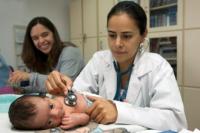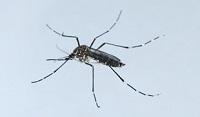Workshop reaffirms the importance of training and the work of health technicians in the post-Covid world
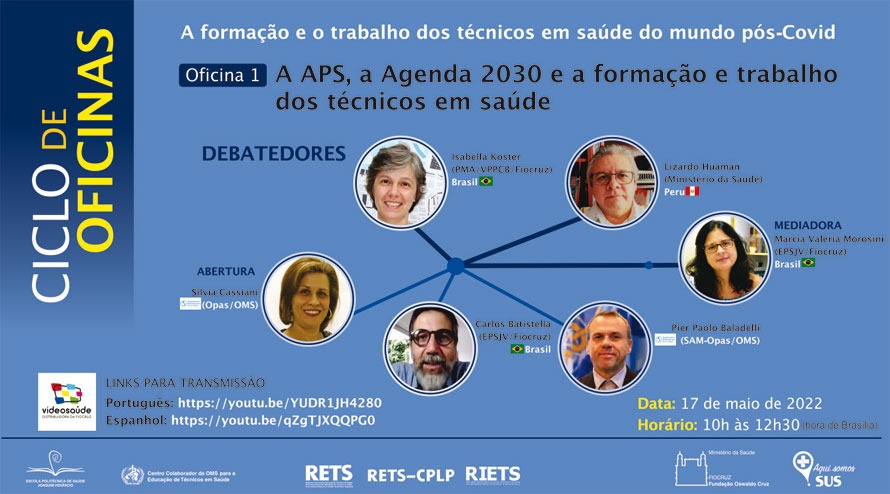 As part of the work plan as a PAHO/WHO Collaborating Center for the Education of Health Technicians, the Joaquim Venâncio Polytechnic School of Health (EPSJV/Fiocruz) began, on May 17, the 2nd cycle of workshops "The training and work of health technicians in the post-Covid world". The first session had the theme "PHC, Agenda 2030 and the training and work of health technicians". The initiative is a cooperation with the International Network for the Education of Health Technicians (RETS), the Ibero-American Network for the Education of Health Technicians (RIETS) and the Network of Technical Health Schools of the Community of Portuguese-speaking Countries (RETS-CPLP). The event also has the support of the Center for International Relations in Health (CRIS/Fiocruz) and VideoSaúde Distribuidora of Fiocruz. "In a context of a global crisis installed by the Covid-19 pandemic, networking was a great opportunity for health technicians and training institutions to start working together with the mechanism to produce information and address common problems," said the advisor of CRIS, Sebastián Tobar.
As part of the work plan as a PAHO/WHO Collaborating Center for the Education of Health Technicians, the Joaquim Venâncio Polytechnic School of Health (EPSJV/Fiocruz) began, on May 17, the 2nd cycle of workshops "The training and work of health technicians in the post-Covid world". The first session had the theme "PHC, Agenda 2030 and the training and work of health technicians". The initiative is a cooperation with the International Network for the Education of Health Technicians (RETS), the Ibero-American Network for the Education of Health Technicians (RIETS) and the Network of Technical Health Schools of the Community of Portuguese-speaking Countries (RETS-CPLP). The event also has the support of the Center for International Relations in Health (CRIS/Fiocruz) and VideoSaúde Distribuidora of Fiocruz. "In a context of a global crisis installed by the Covid-19 pandemic, networking was a great opportunity for health technicians and training institutions to start working together with the mechanism to produce information and address common problems," said the advisor of CRIS, Sebastián Tobar.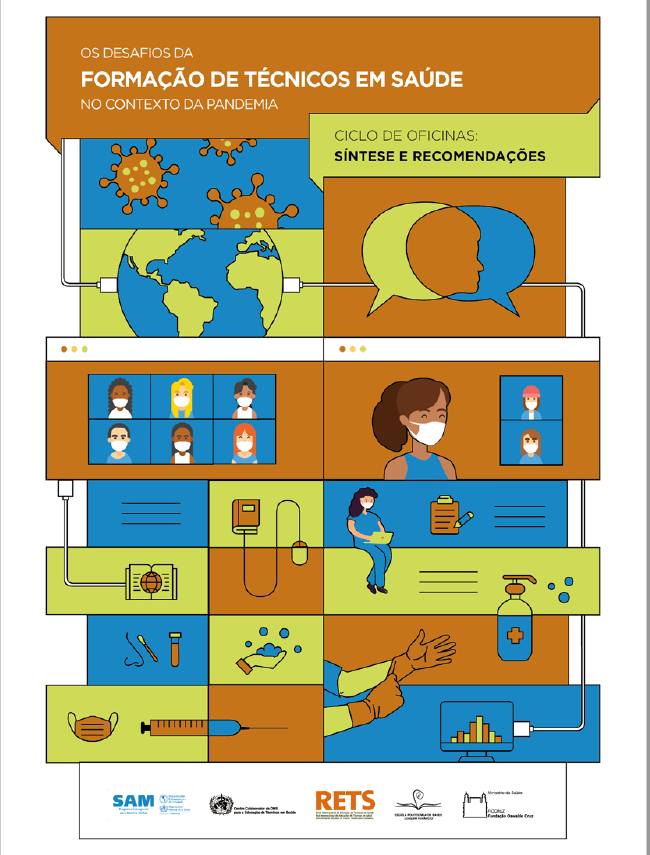
At the event's opening, the e-book "The challenges of training health technicians in the context of the pandemic" was launched. It brings a synthesis of the workshop cycle with the same name, held in 2021. The publication was supported by PAHO/WHO Sub-Regional Program for South America and CRIS. "We hope that this book can circulate widely among institutions and that it will contribute even more to the construction of strategies for strengthening health education," said EPSJV's International Cooperation Coordinator, Carlos Eduardo Batistella.
He pointed out that the Covid-19 pandemic left a trail of more than 500 million infected and more than six million dead, generating the greatest economic, health, and social crisis of our time. "For national health systems, the pandemic, which brought previously unimaginable difficulties, also leaves great scars and many challenges that need to be overcome as soon as possible," he said, citing some: "The discontinuation of community programs and interventions and the disruption in the provision of essential health services, which occurred in almost all countries, caused severe impacts on outpatient programs, emergency care, and elective surgeries, adding new concerns to the existing ones."
According to Batistella, overcoming these challenges and retaking the commitments expressed in Agenda 2030 imply great responsibilities for the institutions, given the importance of coordinating effective responses to the problems and needs of the populations. Batistella explained that the 2nd Workshop Cycle seeks to answer several questions, such as: To what extent can the training and work of health technicians become a strategic public policy alternative for the countries, especially in remote and underserved regions? What innovations can be introduced to train more qualified technicians to work in PHC? What are the main obstacles to the valorization of technical work in health? "The search for the best answers for each context involves the collective construction of knowledge made possible by the strengthening of networking. The fruit of this exchange of experiences is what can be seen in the publication 'The challenges of training health technicians in the context of the pandemic'," he said.
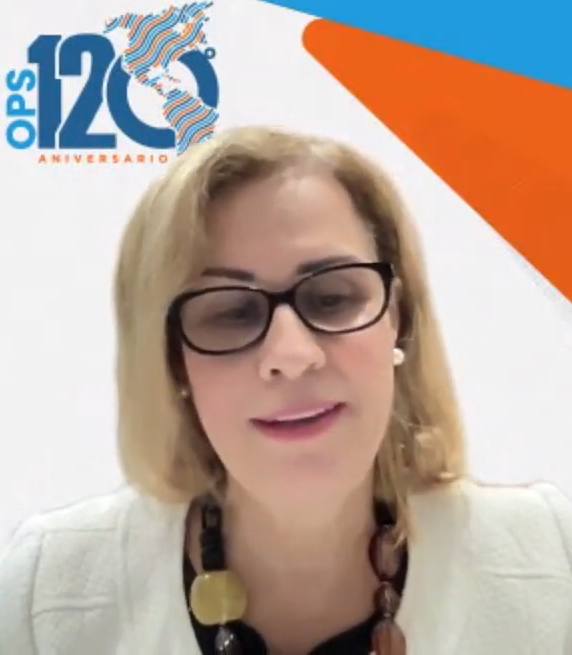 For PAHO/WHO Regional Advisor on Nursing and Technical Health, Silvia Cassiani, the e-book contributes to the discussion about the current situation of human resources in health throughout the Americas. According to her, the region has about 15 million health professionals, while the world has 43.5 million. The UN estimates a shortage of 10 million professionals by 2030 and with 50% of this deficit in the area of Nursing. "In particular, health technicians play a relevant role in the management of this pandemic and in vaccination efforts. Now is an urgent opportunity we have to translate recognition into real and sustainable support. Therefore, improving investment in technician education is a priority strategy to strengthen the resilience of health systems, ensuring adequate continuity and funding, access, and coverage for the population," he opined.
For PAHO/WHO Regional Advisor on Nursing and Technical Health, Silvia Cassiani, the e-book contributes to the discussion about the current situation of human resources in health throughout the Americas. According to her, the region has about 15 million health professionals, while the world has 43.5 million. The UN estimates a shortage of 10 million professionals by 2030 and with 50% of this deficit in the area of Nursing. "In particular, health technicians play a relevant role in the management of this pandemic and in vaccination efforts. Now is an urgent opportunity we have to translate recognition into real and sustainable support. Therefore, improving investment in technician education is a priority strategy to strengthen the resilience of health systems, ensuring adequate continuity and funding, access, and coverage for the population," he opined.
In the view of the director of the PAHO/WHO Subregional Program for South America, Pier Paolo Balladelli, the pandemic determined a delay and even greater distances from those that existed in relation to the Sustainable Development Goals (SDGs) of Agenda 2030. "Being able to marry the work of technicians with this is extremely relevant. The population's access to health services was not a simple task. If before we already had gaps to enjoy the right to health by the population, with the pandemic these gaps increased even more," he lamented.
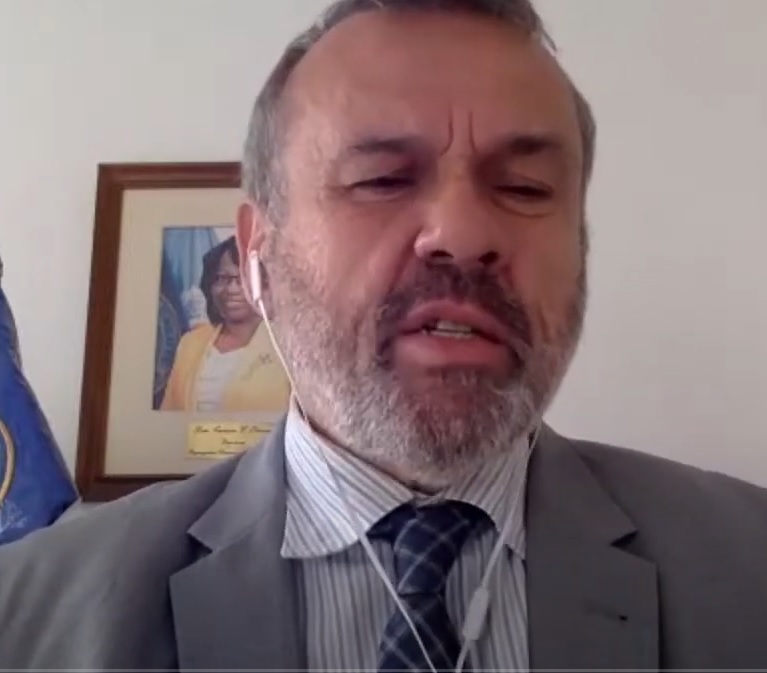 Balladelli said that at least 11 SDGs are related to the health outcomes of the population and to be able to combine the training of technicians with the reduction of these gaps is essential. He pointed out that human resources in Health were impacted in a very evident way during the pandemic and suggested the need to carry out a diagnosis. "They suffered deaths, illnesses, and had unresolved mental health impacts. It is necessary to make a diagnosis to know the strategies faced by the countries, with the intention that this material can present solutions or paths so that we can then have policies and programs that will lead us to more efficient health systems," he pointed out.
Balladelli said that at least 11 SDGs are related to the health outcomes of the population and to be able to combine the training of technicians with the reduction of these gaps is essential. He pointed out that human resources in Health were impacted in a very evident way during the pandemic and suggested the need to carry out a diagnosis. "They suffered deaths, illnesses, and had unresolved mental health impacts. It is necessary to make a diagnosis to know the strategies faced by the countries, with the intention that this material can present solutions or paths so that we can then have policies and programs that will lead us to more efficient health systems," he pointed out.
Still according to the scope of the SDGs, Balladelli believes it is necessary, once again, to emphasize that there is a lack of clarity in identifying the role and function of technicians regarding issues that are not specific to treatment and cure. "It is still necessary that we make an effort and it is a challenge to have a training of health technicians that goes a little bit outside of what is exclusively a care-related program so that they can expand knowledge and skills. If we really want to connect health technicians in their training with the 2030 Agenda, we need to have an interdisciplinary training program that highlights the SDGs and Primary Health Care," he concluded.
PHC, agenda 2030 and the training and work of health technicians
The debate was mediated by EPSJV/Fiocruz researcher-teacher Márcia Valéria Morosini. It brought together Isabella Koster, scientific director of the Brazilian Association of Family and Community Nursing (Abefaco) and coordinator of the Scientific Dissemination Center in the Public Policies and Health Care Models Program (PMA) of the Vice-Presidency of Research and Biological Collections/Fiocruz, and Lizardo Huamán, advisor of the National Directorate of Health Personnel of the Ministry of Health of Peru.
In Márcia Valéria Morosini's view, Primary Health Care (PHC) is a structuring and organizing moment for health systems and the possibility of focusing on the strategic role of the technicians who make up this PHC network and their training needs in a context of great challenges is essential.
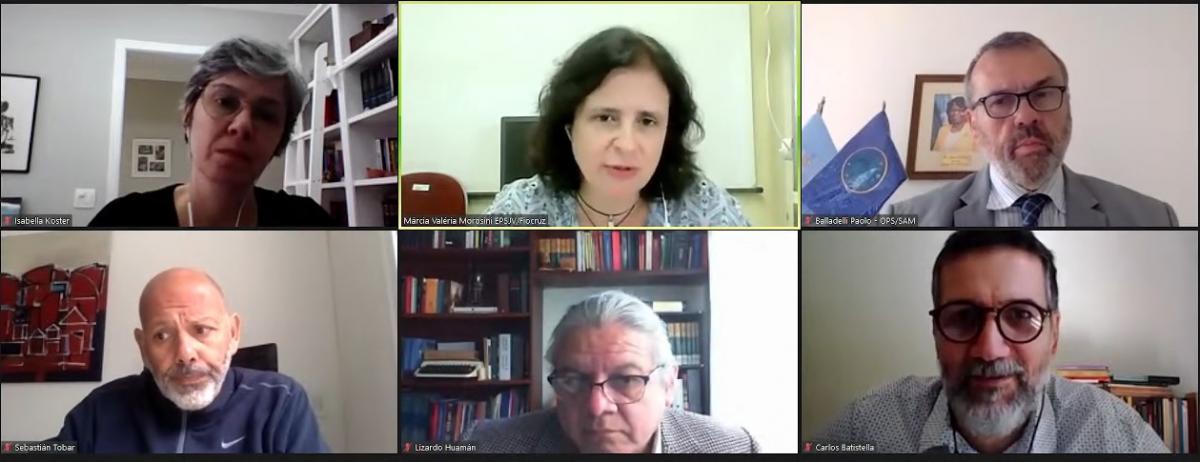
About the Peruvian experience, Lizardo Huamán said that the country has a fragmented health system with several other subsystems. In this context, 35% of all healthcare personnel - about 268,000 workers - are technicians and healthcare assistants. In the first level of care, this becomes even more relevant. They are 37% of a total of 129,000 professionals. "Therefore, the presence of this technical professional is fundamental in our country," he defined.
On how the work of technicians can help countries achieve the goals of Agenda 2030, Lizardo said that substantial changes are needed in the Peruvian health system. "Since our system is bound for individual care, hospital care, and for rare diseases. What is necessary is that we have a system that is based on Primary Care, in which it commands care and articulates all the other services. Therefore, we want to implement integral health networks here", he said.
According to data from the Peruvian Ministry of Health, the country's health technicians and auxiliaries were the health professionals who got sickest and, consequently, died the most throughout the Covid-19 pandemic, followed by administrative staff, nurses, and doctors. "From the news reports, it looked like doctors were the most affected. But in the case of mortality, technicians were also the most affected. This expresses a structural problem of our health system, that technicians, in general, are from a more humble level, have fewer resources, and don't have an organ that defends and guides them," he observed. (Lizardo Huamán Presentation - spanish)
Isabella Koster revealed that, in Brazil, technical education is mostly carried out in the subsequent modality, through a private educational network, with a concentration of institutions in the Southeast region, carried out as in-service training and through large professional training projects stimulated by the States with much criticism and assertiveness. "The formation of workers must be a process of construction of scientific and technological knowledge and human formation, in a way that can overcome the professional education model based on technicist education and in-service training. This is a great challenge", she pointed out.
For Isabella, health technicians have a strategic role in the post-pandemic context, in which there is an increase in mental disorders, multiple forms of violence, vulnerabilities, inequalities and poverty, besides impacts in all segments of education. "The scope of practices and the nature of the work of these technicians places them close to the bodies and souls of individuals, going through the daily life of families and the dynamics of the territory, favoring the perception of new situations and problems that collaborate in integral care together with the multidisciplinary team," he said.
Thinking about strategies common to the technicians in Oral Health, Nursing, and Community Agents, Isabella exemplified that there is a broad participation in the elaboration and implementation of new flows and routines in the units in their respective areas, besides the welcoming at the entrance both in the basic units and in the territories, for the access to care, including conflict management. "Another strategic role is the participation in health education and information to combat the effects of fake news, guidance and circulation of educational materials, as well as active surveillance, aiming care and monitoring," she said.
At the end, Isabella pointed out that PHC in Brazil has a fundamental role in articulating actions. It has the possibility of including the life produced in the territories and continue caring for sick people with other comorbidities, producing care actions: "It is urgent the recovery of PHC and the strengthening of the Family Health Strategy as a model. (Isabella Koster Presentation - port)

